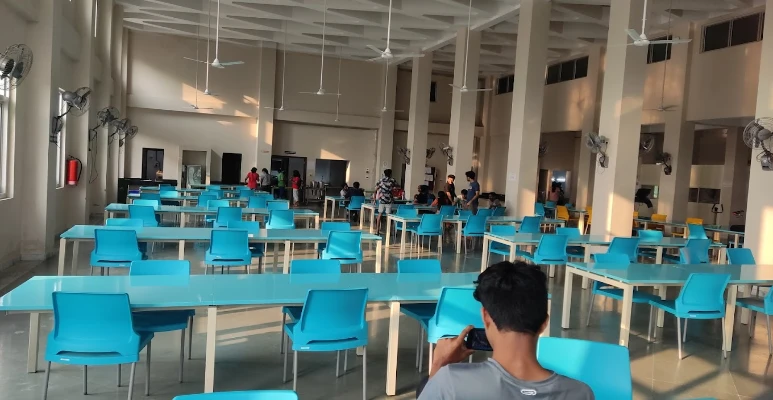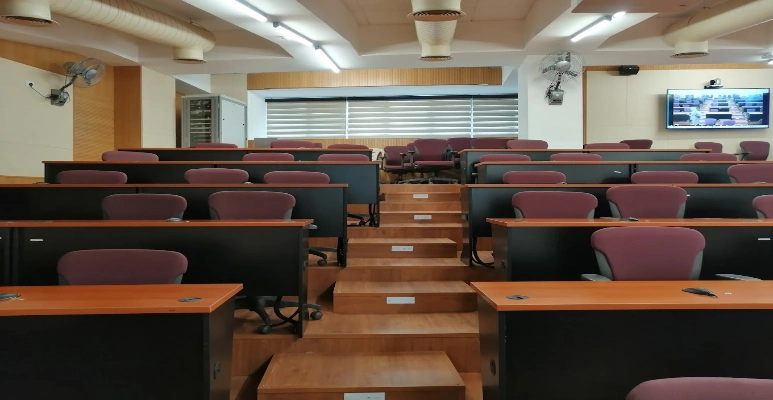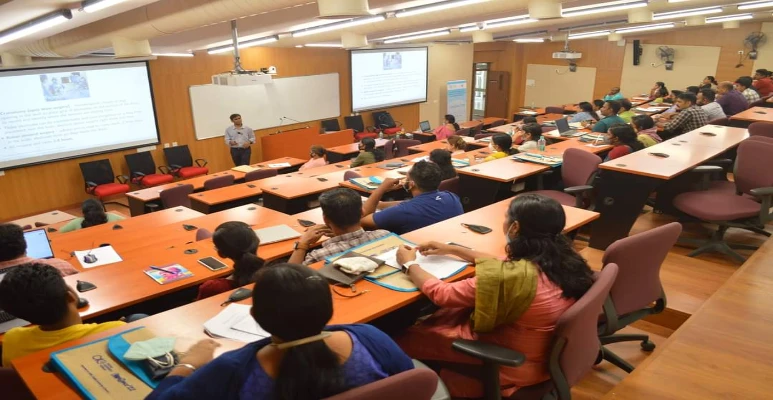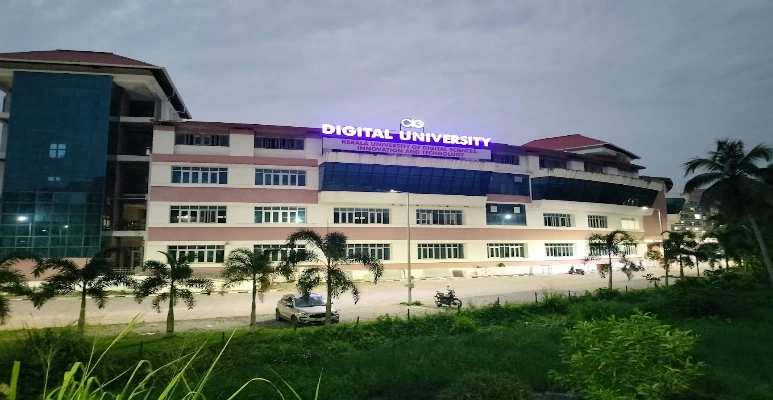The (Digital University Kerala) is the Indian Institute of Information Technology and Management Kerala (IIITM-K) was set up in 2000 by the Kerala government as an important and independent institute. On January 18, 2020, the Kerala government decided to upgrade IIITM-K to a university through Ordinance No. 9 of 2020. This led to the formation of the Kerala University of Digital Sciences, Innovation, and Technology (KUDSIT). The university was officially established with the Kerala University of Digital Sciences, Innovation and Technology Act, 2021 (Act 10 of 2021).
The new university aims to become a global leader in advanced research and in developing young talent, focusing on modern technologies and innovations in disruptive fields. Throughout this article, you will get all the information about Digital University Kerala like courses offered, facilities, eligibility criteria etc.
[Index]
Highlights
The below table shows the important highlights of the Digital University Kerala, Let’s have a look.
| Particulars | Details |
| Name | Digital University Kerala |
| Location | Thiruvananthapuram, Kerala |
| University Type | State University |
| Establishment | 2020 |
| Affiliation | Cochin University of Science and Technology |
| Entrance Exam | CUET PG |
| Hostel Facilities | Yes |
| Official website | https://duk.ac.in/ |
Facilities
These are some facilities offered by the Digital University Kerala to their students who are interested in studying or already studying at this university.
| Central Facilities | Medical |
| Computer Centre | Classrooms |
| Central Library | Laboratories |
| Sports Section | Wi-Fi |
| Institute Management System | Hostel |
Courses Offered
Digital University Kerala offers many PG courses to students. Check the list of courses mentioned below. Let’s have a look.
| Courses | Duration | Intake |
| M.Tech. (AICTE Approved) Computer Science and Engineering | 2 Year | 90 |
| MSc. Computer Science with specialization in Cybersecurity | 2 Year | 90 |
| MSc. Computer Science with specialization in Machine Intelligence | 2 Year | 45 |
| MSc. Computer Science with specialization in Data Analytics | 2 Year | 60 |
| MSc. Data Analytics & Bio-AI | 2 Year | 30 |
| MSc. Data Analytics & Computational Science | 2 Year | 50 |
| MSc. Data Analytics & Geoinformatics | 2 Year | 30 |
| M.Tech. (AICTE Approved) Electronics Engineering | 2 Year | 60 |
| M.Tech. Electronic Product Design | 2 Year | 15 |
| MSc. Electronics | 2 Year | 60 |
| MSc. Applied Physics | 2 Year | 20 |
| MBA (AICTE Approved) | 2 Year | 60 |
| MBA for working professionals (AICTE Approved) | 2 Year | 30 |
| MSc. Ecology with specialization in Ecological Informatics | 2 Year | 30 |
| MSc. Informatics (Master’s Program in Digital Leadership and Transformation) | 2 Year | 30 |
| Postgraduate Diploma in MRITECH (Magnetic Resonance Imaging Technology) | 1 Year | – |
| PhD (Full time regular, Part time regular, Industry regular) | 1 Year | 40 |
Admission Process
We have mentioned the admission procedure to get admission to the Digital University Kerala. Check the procedure listed below.
M.Sc. and MBA:
Applicants for both Master of Science (M.Sc.) and Master of Business Administration (MBA)
programs must take one of the following entrance exams:
- Digital University Admission Test (DUAT-2024) conducted by Digital University Kerala.
- Central Universities Entrance Test (CUET(PG)-2024) conducted by NTA for admission to various postgraduate programs.
M. Tech.:
Admission to M. Tech. programs may involve two options:
- National Level Exams: Applicants can take either the CUET(PG)-2024 exam or the Graduate Aptitude Test in Engineering (GATE) exam.
- School-Specific Admission Procedure: MTech. programs at Digital University Kerala have school-specific admission procedures as well.
MBA (Alternative Option):
For MBA programs only, applicants with a valid score in one of the following national-level
management entrance exams can also be considered for admission:
- CAT (Common Admission Test) conducted by IIMs
- GRE (Graduate Record Examinations)
- CMAT (Central Management Admission Test)
- KMAT (Kerala Management Aptitude Test)
- XAT (Xavier Aptitude Test)
- NMAT by GMAC (Graduate Management Admission Council) / GMAT
Applicants who qualify through these exams will be shortlisted for a group discussion followed
by an interview.
Ph.D.:
A valid NET score is required for consideration. However, candidates who have not successfully
cleared NET are encouraged to partake in the Digital University Research Aptitude Test (DRAT)- The scheduling for DRAT will depend on the availability of PhD vacancies.
Eligibility Criteria
To be eligible for admission into the university’s programs candidates need to meet the eligibility criteria set by the Digital University Kerala. We have listed the eligibility criteria in the table below.
PG/Phd. Courses Eligibility
| Courses | Eligibility Criteria |
| M.Tech. (AICTE Approved) | B.Tech or BE in CS/IT/ECE or related fields OR MCA OR M.Sc in CS/IT/Mathematics/Statistics/Physics with 60% aggregate marks or above (relaxation as per university norms). |
| MSc. Computer Science with specialization in Cybersecurity | B.Tech/BE in any branch OR B.Sc with Mathematics as a core or complementary subject OR BA Mathematics OR BCA with 60% aggregate marks or above (relaxation as per university norms). |
| MSc. Computer Science with specialization in Machine Intelligence | B.Tech/BE in any branch OR B.Sc with Mathematics as a core or complementary subject OR BA Mathematics OR BCA with 60% aggregate marks or above (relaxation as per university norms). |
| MSc. Computer Science with specialization in Data Analytics | Science/Engineering/Mathematics graduate with Mathematics/Statistics as one of the core/complementary subjects with 60% aggregate marks or above (relaxation as per university norms). |
| MSc. Data Analytics & Bio-AI | Any Science/Engineering graduate, including BSc in Botany/Zoology/Biosciences/ Microbiology/Biotechnology, BTech in Biomedical Engineering/BioTechnology, MBBS, with aggregate 60% marks or above. Relaxation in marks to reserved candidates as per university norms. |
| MSc. Data Analytics & Computational Science | Science/Engineering/Mathematics graduate with Mathematics/Statistics as a core/complementary subject with 60% aggregate marks or above (relaxation as per university norms). |
| MSc. Data Analytics & Geoinformatics | BSc in Geology/Geography/Computer Science/IT/Environmental Science/Agricultural Science OR BTech in Civil/Computer Engineering with 60% aggregate marks or above (relaxation as per university norms). |
| M.Tech. (AICTE Approved) Electronics Engineering | B.Tech/BE in EE/ECE/AEI/EI/Robotics/IoT or similar branches OR MSc in Electronics/Instrumentation with 60% aggregate marks or above (CS/CSE/IT not eligible; relaxation as per university norms). |
| M.Tech. Electronic Product Design | Any B.Tech or MSc degree with 60% aggregate marks or above (relaxation as per university norms). |
| MSc. Electronics | Any branch of B.Sc/B.Tech/BCA/MBBS with 60% aggregate marks or above (relaxation as per university norms). |
| MSc. Applied Physics | Any branch of B.Sc/B.Tech/BCA/MBBS with 60% aggregate marks or above (relaxation as per university norms). |
| MBA (AICTE Approved) | Bachelor’s degree in any field with 60% aggregate marks or above (relaxation as per university norms). |
| MBA for working professionals (AICTE Approved) | Bachelor’s degree in any field with 60% aggregate marks or above and minimum 2 years of work experience (relaxation as per university norms). |
| MSc. Ecology with specialization in Ecological Informatics | B.Sc. Degree in Botany/Zoology/Life Science/Chemistry /Physics /Mathematics /Statistics/Ecology /Environmental Science /Geography /Geology /Microbiology /Plant Science /Animal Science /Agriculture /Forestry /Horticulture / Biotechnology and allied areas OR B.Tech/BE in Civil, Mechanical, Chemical, Environmental, Agricultural Engineering and allied disciplines with aggregate 60% marks or above. Relaxation in marks to reserved candidates as per University norms. |
| MSc. Informatics (Master’s Program in Digital Leadership and Transformation) | Bachelor’s degree in any field with 60% aggregate marks or above (relaxation as per university norms). |
| Postgraduate Diploma in MRITECH (Magnetic Resonance Imaging Technology) | Students who have completed the Bachelors degree, or currently in the final semester and completing all requirements for the degree by end of June 2024 in any branch of Engineering or Masters degree in Mathematics, Statistics, Physics, Computer/Data Science, Medical Imaging Technology or related fields from a UGC recognized University are eligible to apply. Minimum score of 60 percentage marks OR CPI/CGPA of 6.5 or above in 10 points in the qualifying degree is required. |
| PhD (Full time regular, Part time regular, Industry regular) | 2-year Master’s or M.Phil degree with 60% marks in relevant discipline (55% for reserved categories). Final year students may apply with minimum required marks; part-time and Industry PhD applicants need full-time jobs and 5 years of work experience after a Bachelor’s degree. |
Fee Structure
This section will provide detailed information about the Digital University Kerala Fee Structure for the courses by the university. Let’s have a look.
| Courses | Tuition Fees First Semester |
| MTech/MSc Programs | 55,000 |
| MBA Program | 1,00,000 |
| Ph.D. Programme (Part-time Regular Ph.D) | Rs. 50,000/year |
| Industry Regular Ph.D | Rs. 50,000/year |
DUAT-2024 Syllabus
Below in this section is Provided Digital University Kerala Programmes Syllabus.
Programme: MSc Informatics, Master of Business Administration
| Question type | Syllabus |
| General Aptitude (20 Marks) | Verbal Aptitude: Basic English grammar (tenses, articles, adjectives, prepositions, conjunctions, verb-noun agreement, and other parts of speech). Basic vocabulary (words, idioms, phrases in context), narrative sequencing. Quantitative Aptitude: Data interpretation (data graphs like bar graphs, pie charts, 2D and 3D plots, maps, tables), numerical computation (ratios, percentages, powers, exponents, logarithms, permutations, combinations, series, mensuration, geometry). Analytical Aptitude: Logic (deduction, induction, analogy, numerical relations, reasoning). Spatial Aptitude: Transformation of shapes (translation, rotation, scaling, mirroring, assembling, grouping, paper folding, cutting, 2D and 3D patterns). |
| Mathematics (20 Marks) | Topics include probability, statistics, calculus, discrete mathematics, basic number theory, and algebra. |
| English Reading Comprehension (20 Marks) | Two paragraphs, each containing 5-10 questions. |
Programme: MSc Computer Science with Data Analytics; MSc Data Analytics and Computational Science
| Question type | Syllabus |
| General Aptitude (20 Marks) | Verbal Aptitude: Basic English grammar (tenses, articles, adjectives, prepositions, conjunctions, verb-noun agreement, and other parts of speech). Basic vocabulary (words, idioms, and phrases in context), narrative sequencing. Quantitative Aptitude: Data interpretation (data graphs, 2D and 3D plots, maps, tables), numerical computation (ratios, percentages, powers, exponents, logarithms, permutations, combinations, series, mensuration, geometry). Analytical Aptitude: Logic (deduction, induction, analogy, numerical relations, reasoning). Spatial Aptitude: Transformation of shapes (translation, rotation, scaling, mirroring, assembling, grouping, paper folding, cutting, 2D and 3D patterns). |
| Basic Mathematics (30 Marks) | Set Theory: Union, intersection, cardinality, elementary counting, permutations, and combinations. Probability and Statistics: Basic probability concepts, averages, dependent/independent events, frequency distributions, measures of central tendencies/dispersion. Algebra: Fundamental operations, expansions, factorization, simultaneous equations, indices, logarithms, progressions, determinants, matrices. Coordinate Geometry: Cartesian coordinates, distance formula, equations of lines, intersection of lines, circles, parabolas, ellipses, hyperbolas. Calculus: Limits, continuity, differentiation, tangents, maxima/minima, integration techniques, definite integrals, applications to areas. Vectors: Position vectors, vector operations, scalar and vector products, applications in geometry/mechanics. Trigonometry: Identities, equations, properties of triangles, solutions of triangles, heights/distances, general solutions of trigonometric equations. |
| BSc Level Questions (10 Marks) | Computer Basics: Organization of a computer, CPU structure, input/output devices, computer memory, back-up devices. Data Representation: Character/integer/fraction representation, binary/hexadecimal representations, binary arithmetic (addition, subtraction, multiplication, division), two’s complement, floating-point numbers, Boolean algebra, truth tables, Venn diagrams. |
Programme: MSc Ecology with Specialization in Ecological Informatics
| Question Type | Syllabus |
| General Aptitude (20 Marks) | Verbal Aptitude: Basic English grammar (tenses, articles, adjectives, prepositions, conjunctions, verb-noun agreement, other parts of speech), basic vocabulary (words, idioms, phrases in context), narrative sequencing. Quantitative Aptitude: Data interpretation (bar graphs, pie charts, data plots), numerical computation (ratios, percentages, exponents, logarithms, series, mensuration, geometry). Analytical Aptitude: Logic (deduction, induction, analogy, reasoning). Spatial Aptitude: Shape transformation (translation, rotation, scaling, mirroring, grouping, paper folding, cutting, 2D/3D patterns). |
| Mathematics (20 Marks) | Probability, statistics, calculus, discrete mathematics, basic number theory, algebra. |
| English Reading Comprehension (20 Marks) | Two paragraphs with 5-10 questions each. |
Placement Highlights
Check the key highlights of the Digital University Kerala placements 2024 from the table below:
- 100% internship record as industry/academic internship is mandatory at DUK.
- Internships often lead to recruitment as companies hire high performing interns.
- Internship-cum-placement along with the campus recruitment by visiting companies grants DUK an impressive placement record of over 95%.
- Progressive Placement and other Industry Institute Interactions (III) are underway.
Top Recruiters
These are some top companies that visit in Digital University Kerala for placement.
| Digital University Kerala: Top Recruiters | |
| TCS | Allianz |
| Innovation Incubator | TATA ELSXI |
| Nokia | Infosys |
| Livares Technologies | CaterPillar |
Contact Details
Digital University Kerala
Address: Technocity Campus Mangalapuram Thonnakkal P.O, Kerala 695317
College Gallery



